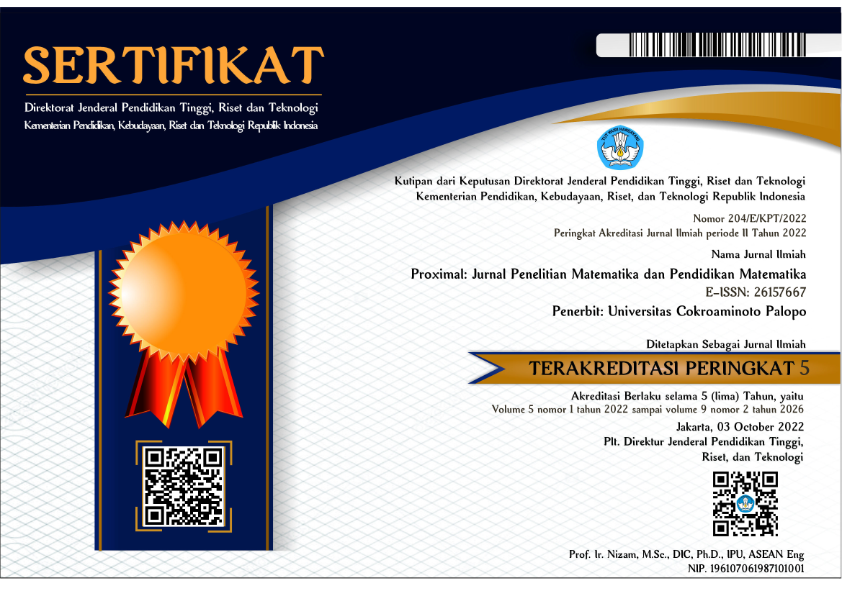Efektivitas Model Problem Based Learning Dengan Pendekatan Open Ended Untuk Meningkatkan Hasil Belajar Matematika Siswa Kelas VII SMPN 3 Bajo
Keywords:
Model Problem Based Learning, Pendekatan Open Ended, Bangun Datar Segiempat dan SegitigaAbstract
Penelitian ini adalah penelitian eksperimen yang bertujuan untuk mengetahui keefektifan model problem based learning dengan pendekatan open ended untuk meningkatkan hasil belajar matematika siswa materi bangun datar segiempat dan segitiga. Subjek penelitian ini adalah VII2 dengan jumlah sebanyak 30 orang. Pertemuan dikelas dilaksanakan sebanyak empat kali pertemuan. Instrumen penelitian yang digunakan adalah lembar hasil belajar siswa, lembar aktivitas siswa, angket respon siswa, dan lembar keterlaksanaan pembelajaran. Hasil penelitian menunjukkan bahwa model problem based learning dengan pendekatan open ended untuk meningkatkan hasil belajar matematika siswa materi bangun datar segiempat dan segitiga sangat efektif digunakan dan diterapkan, hasil belajar matematika aspek kognitif siswa sebelum dan setelah diterapkan model problem based learning dengan pendekatan open ended secara berturut-turut berada pada kategori cukup ideal dan sangat ideal, hasil belajar matematika aspek keterampilan siswa sebelum dan setelah diterapkan model problem based learning dengan pendekatan open ended secara berturut-turut berada pada kategori cukup ideal dan ideal, respon siswa setelah diterapkan model problem based learning dengan pendekatan open ended berada pada kategori positif, terjadi peningkatan hasil belajar matematika aspek kognitif dan aspek keterampilan siswa kelas VII SMPN 3 Bajo setelah diterapkan model problem based learning dengan pendekatan open ended, model problem based learning dengan pendekatan open ended efektif untuk meningkatkan hasil belajar matematika siswa.
Downloads
References
Evawati, 2007. Filsafat Dunia Matematika Pengantar Untuk Memahami Konsep-Konsep Matematika, Jakarta: Prestasi Pustakarya.
Frans, H., 2007. Evaluasi Kinerja Instalasi Farmasi Rumah Sakit Umum Daerah Lakipadada Kabupaten Tana Toraja dengan Pendekatan Balanced Scorecard. Tesis. Magister Manajemen Farmasi, Universeitas Gadjah Mada, Yogyakarta.
Hardjana, 2000. Definisi Efekitf, Online.http://ebookbeta.com/definisi/efektivitas; menurut-paraahli-page.com.html.
Isjoni. 2013. Pendekatan Saintifik dan Kontekstual dalam Pembelajaran Abad 21, Bogor: Ghalia Indonesia.
Istarani, 2011. Pembelajaran Inovatif, Medan: Media Persada.
Putra, 2013. Desain Belajar Mengajar Kreatif Berbasis Sains, Yogyakarta: Diva Press.
Rusman, 2010. Model-Model Pembelajaran, Jakarta: Raja Grafindo Persada.
Rusmono. 2012. Strategi Pembelajaran dengan Problem Based Learning Itu Perlu, Jakarta: Ghalia Indonesia.
Suprijono Agus. 2013. Cooperative Learning Teori & Aplikasi Paikem (Edisi Revisi), Yogyakarta: Pustaka Pelajar.
Trianto. 2007. Model Pembelajaran Terpadu, Surabaya: Bumi Aksara.
Downloads
Published
How to Cite
Issue
Section
License
In submitting the manuscript to the journal, the authors certify that:
- They are authorized by their co-authors to enter into these arrangements.
- The work described has not been formally published before, except in the form of an abstract or as part of a published lecture, review, thesis, or overlay journal.
- That it is not under consideration for publication elsewhere,
- That its publication has been approved by all the author(s) and by the responsible authorities – tacitly or explicitly – of the institutes where the work has been carried out.
- They secure the right to reproduce any material that has already been published or copyrighted elsewhere.
- They agree to the following license and copyright agreement.
License and Copyright Agreement
Authors who publish with this journal agree to the following terms:
- Authors retain copyright and grant the journal right of first publication with the work simultaneously licensed under Creative Commons Attribution License (CC BY 4.0) that allows others to share the work with an acknowledgment of the work's authorship and initial publication in this journal.
- Authors are able to enter into separate, additional contractual arrangements for the non-exclusive distribution of the journal's published version of the work (e.g., post it to an institutional repository or publish it in a book), with an acknowledgment of its initial publication in this journal.
- Authors are permitted and encouraged to post their work online (e.g., in institutional repositories or on their website) prior to and during the submission process, as it can lead to productive exchanges, as well as earlier and greater citation of published work.















